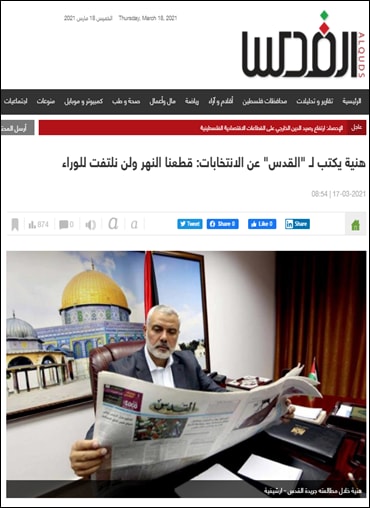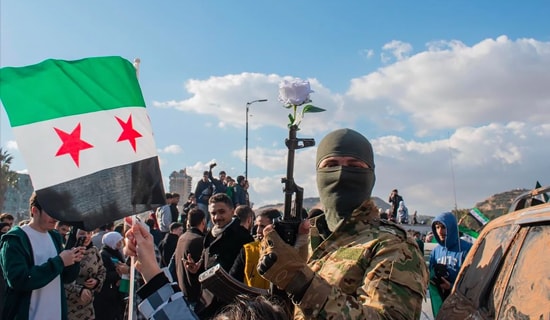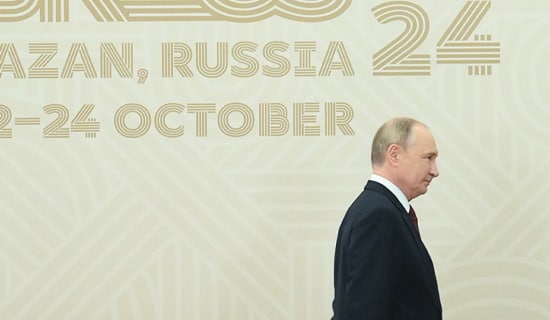Amid the Palestinian Authority's preparations to hold elections to the Palestinian Legislative Council (PLC), the presidency and the Palestinian National Council (PNC), and following recent talks in Cairo ahead of the elections, attended by representatives of the various Palestinian factions, the Palestinian daily Al-Quds, based in East Jerusalem, published an article by Hamas Political Bureau head Isma'il Haniya aimed at "clarifying Hamas's position on and vision of" the elections.
In the article, published on March 17, 2021, Haniya states that Hamas sees the elections as a way to end the Palestinian schism; build a new political system incorporating all the Palestinian factions, both inside Palestine and in the diaspora, and unite the efforts of the Palestinians and of the entire Arab and Islamic nation to confront Israel and stop the regional process of normalization with it. Haniya stresses that Hamas is committed to the elections and to the understandings that have been reached in this context, and has no intention of reneging on these understandings.
Two essential points stand out in Haniya's article. First, he emphasizes that Hamas prefers to run for the PLC elections, scheduled for May, as part of "a joint national list encompassing the widest possible spectrum of national [forces]." Second, he stresses that after the elections the Palestinians will have to formulate a strategy for confronting Israel "using all forms of struggle that are possible for our people – chief of them military resistance, while focusing on popular resistance at the present stage."
These two statements give rise to significant questions regarding Haniya's intensions and their practical implications. The issue of a joint list has been debated for some time by Hamas and Fatah officials, but has yet to be settled. The suggestion is that Fatah and Hamas, and all other movements wishing to join the list, will agree on the number of members from each movement and on their place on the list. The advantage of a joint list for Fatah and Hamas is that it enables both movements to secure places for their members in the next PLC, and also to determine in advance the division of seats between them – so that no side will face a landslide victory by the other. A joint list can therefore serve as an effective compromise, ensuring that elections will indeed be held and will not be postponed again, and that the PLC will renew its activity – even if its makeup will not necessarily reflect the will of the voters.
For Hamas, which does not enjoy international legitimacy because it refuses to meet the demands of the Quartet – namely the demands to recognize Israel and the agreements with it and to renounce the armed struggle[1] – running in a joint list has another advantage. Entering the PLC with a Fatah seal of approval may prevent a scenario whereby the international community refuses to recognize the outcome of the elections.
However, a joint Hamas-Fatah list is an odd idea, given the years-long hostility between the two movements and the deep political rifts between them, and especially given Hamas' aforementioned lack of international legitimacy due to its rejection of the Quartet's demands. In the recent weeks, Fatah and Hamas officials have admitted that a joint list is indeed unlikely in light of the differences between the two movements' political platforms. However, this option continues to be mentioned by other Fatah and Hamas officials and in reports leaked to the media. Until the final lists are published, the fate of this initiative will remain unclear.
The second point that stands out in Haniya's article is the ambiguous message regarding the strategy of resistance against Israel to be adopted after the elections. As stated, he stresses the need to formulate a strategy "based on the principle of resistance by various means, using all forms of struggle that are possible for our people – chief of them military resistance, while focusing on popular resistance at the present stage." This vague statement is apparently aimed at holding the stick at both ends. It expresses, on the one hand, that Hamas remains committed to armed struggle and in fact considers this to be the chief form of struggle, but on the other hand, that in the present stage Hamas means to focus on popular resistance.
The statement about focusing on popular resistance at the present stage may be intended for the ears of the Quartet, which demands that Hamas abandon the path of violence. According to reports, in preparation for the planned PA elections, Hamas has agreed to temporarily give up armed resistance and focus on popular struggle, apparently in order to convince the Quartet and the international community to recognize the Palestinian elections and their outcomes. Hamas has not denied these statements, although, at the same time, its officials continue to encourage armed resistance. [2] Thus, it cannot be ruled out that this is a temporary tactic by Hamas, to be implemented at least until the completion of the elections, aimed at ensuring the establishment of new institutions in which Hamas is represented.

Haniya's article in Al-Quds (Source: Al-Quds, East Jerusalem, March 17, 2021)
The following are translated excerpts from Haniya's March 17, 2021 article in Al-Quds. [3]
"…As the election train set out on its journey, Hamas insisted that the elections [themselves] be preceded by a serious and responsible national dialogue [between the various Palestinian factions], in order to draw a road map for completing the three-stage process – the elections to the PLC, the presidency and the PNC – and to remove any obstacles from the path… Everyone must shoulder the historic responsibility that requires holding national elections that will enable the Palestinian citizen to realize his fundamental right of electing his representatives to the various representational institutions of leadership. We must not allow a situation where [the citizen's] choice is usurped or circumvented or his free will is contradicted…
"Hamas wants the elections to be the first step in a comprehensive overhaul of the Palestinian home and of rebuilding the Palestinian political system – so it can meet the ongoing challenges facing the Palestinian arena and include all the active [political] forces of our people, inside [Palestine] and in the diaspora, on a basis of unity, partnership and integration. The result [of this process] will be a final end to the state of schism and a strengthening of the Palestinian institutions, so that no future political disagreement will be able to develop and grow [into a rift]. On the contrary, our political system will be able to effectively contain any disagreements and disputes that may emerge and deal with any changes that occur in the political situation…
"Moreover, Hamas wants these elections to pave the way to uniting the efforts of the [entire] Arab and Muslim nation in the context of the Palestinian cause, and to neutralizing all the threats [stemming from] the strategic and dangerous vulnerability of the region. [This will be achieved] by stopping the normalization [agreements] and the hankering after the Israeli occupation at the expense of our people's rights and of the holy shrines of Islam and Christianity.
"In order to achieve all the national goals in these elections, Hamas determined that its preferred manner of participation in the PLC elections is to be part of a joint national list encompassing the widest possible national spectrum [and committed to] preserving the national principles as expressed in the National Accord Document [of 2006][4] and in the conclusions of the meeting of the secretary-generals [of the Palestinian factions in September 2020].[5] After the elections we will establish a national accord government encompassing all [the factions], including the elements that did not participate in the PLC elections [such as the Palestinian Islamic Jihad].[6] This government will manage the subsequent stages of the elections process [i.e., the presidential and PNC elections], oversee the removal of all the residues of the schism and pave the way to a real reconciliation between all [the sides].
"It is impossible to talk about settling the [intra-]Palestinian issues and promoting them without involving all the components of our [Palestinian] people, wherever they are in the world. This [process] cannot be confined to our people inside Palestine, because the members of the Palestinian diaspora are an authentic part [of our people], who have been paying the price of their expulsion from their land for many decades. They are at the center of the sacred issue of the right of return, and constitute one of the most important aspects of the struggle against the occupation. Accordingly, Hamas has always taken the clear position that the [general] election must lead to [the establishment of a new] PNC, as a preliminary step towards rebuilding the PLO on a democratic basis and renewing its institutions on a basis of partnership – so that [the PLO], as the representative of the entire Palestinian people, will include all the currents of the people, and will manage the political struggle vis-à-vis the occupation, raise [the Palestinian] issue in every forum and manage the struggle as part of this general national framework [i.e., the PNC].
"After completing, by means of the elections, the construction of the political system on the level of the PA and PLO, we Palestinians – [including all] the factions, [political] forces, elected institutions and social forces – will continue to the most important stage, which is one of the goals of the elections to the various institutions, namely the formulation of a comprehensive, united and integrated strategy for the struggle to achieve the objectives of our people: liberation and return. This strategy will be based on the principle of resistance by various means, using all forms of struggle that are possible for our people – chief of them military resistance, while focusing on popular resistance at the present stage. Also, [as part of this strategy] responsibilities will be divided [between the various elements], taking into consideration the abilities and expertise of each element and institution and its presence in various arenas, so as to eventually create a melting pot fusing all the abilities of our people, which, we believe, is able to achieve its goals and aspirations.
"Hamas regards the general elections and their various stages as a serious national enterprise… that enables resolving the [intra-]Palestinian issues on a basis of true partnership in which the will of the people is the deciding factor. Therefore, we will act, as we have acted at every stage and juncture, to complete this move, while taking all the measures and positions required, and opposing any measure that can impede or thwart this move.
"Some members of the political elite are questioning the effectiveness of the elections, and whether they are a means of ending the schism and reaching an understanding, or [should be] the result [of ending the schism]. Each of these positions has its logic, but in the situation we are experiencing, we will not necessarily take the traditional position – especially given that, since the beginning of the schism, we have tried all the options and methods. So let the elections serve as a way and a means to achieve a goal that is certainly a bigger [goal] than the elections themselves.
"Our mission today is not just to [determine] how the process will proceed, but to [determine] how it can succeed, and we will conduct ourselves honesty and out of commitment to everything that has been agreed upon. We have already crossed the Rubicon, and will not turn back."
* Y. Yehoshua is Vice President for Research and Director of MEMRI Israel.
[1] The Quartet has presented these demands as conditions for recognizing any government of which Hamas is part.
[2] On February 21, 2021 it was reported that the PA had sent a letter to the Biden administration and to the Quartet stressing that all the Palestinian factions participating in the elections, including those that are not part of the PLO, such as Hamas, are committed to "a Palestinian state on the 1967 borders" and to non-violent popular resistance. On February 23, the Saudi website Elaph.com reported that Hamas Political Bureau deputy head Salah Al-'Arouri had conveyed a message to Fatah Central Committee secretary Jibril Al-Rajoub stating that Hamas "is committed to the two-state solution and to the establishment of a Palestinian state on the 1967 borders," and that it would become "a popular movement [waging] unarmed resistance." See Inquiry and Analysis No. 1562 – Senior Hamas Officials: We Intend To Run For Office In Elections While Maintaining The Armed Struggle For The Palestinian Land 'From The River To The Sea', March 8, 2021.
[3] Al-Quds (Jerusalem)
[4] The National Accord Document, signed on May 10, 2006, was drawn up by five Palestinian leaders imprisoned in Israel, representing Fatah, Hamas, the PIJ, the Popular Front for the Liberation of Palestine and (PFLP) and the Democratic Front for the Liberation of Palestine (DFLP). It includes a demand to hold elections and incorporate the Hamas and PIJ in the PLO.
[5] The reference is to a September 3, 2020 video conference of Palestinian leaders in Ramallah and Beirut, attended by the heads of the main Palestinian factions, including PA President and PLO chairman Mahmoud 'Abbas and Hamas political bureau head 'Isma'il Haniyya. The conference's concluding statement included a commitment to hold elections, incorporate all the Palestinian factions in the PLO and establish a joint framework to direct the Palestinian "popular resistance." Wafa.ps, September 3, 2020.
[6] The Palestinian Islamic Jihad (PIJ) has announced that it will not participate in the elections to the PLC, because this body was created as part of the Oslo Accords, which the PIJ refuses to recognize. However, it means to participate in the elections to the PNC.





